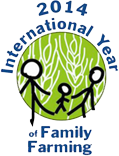Items in the category "Global Conferences on ARD"
 [Document]
[Document]
 [News] Stakeholder participation is central for reforming agricultural research for development. It is central for improved foresight, too. What does it mean in practice? See below what happened during the GCARD2 foresight sessions: 60% of the Chairs and...
[News] Stakeholder participation is central for reforming agricultural research for development. It is central for improved foresight, too. What does it mean in practice? See below what happened during the GCARD2 foresight sessions: 60% of the Chairs and...
 [Document] In this paper/presentation addressing CG perspectives in research on agro-biodiversity, the focus and emphasis is on the plant dimension of agricultural biodiversity, with particular emphasis on the in situ conservation and on-farm management and use of agro-biodiversity.
[Document] In this paper/presentation addressing CG perspectives in research on agro-biodiversity, the focus and emphasis is on the plant dimension of agricultural biodiversity, with particular emphasis on the in situ conservation and on-farm management and use of agro-biodiversity.
 [Document] The first Global Conference on Agricultural Research for Development (GCARD) in 2010 catalyzed a plan to transform agricultural research and development (R&D) around the world. The resulting GCARD Roadmap recommends a regularized process of monitoring institutional, human, and financial...
[Document] The first Global Conference on Agricultural Research for Development (GCARD) in 2010 catalyzed a plan to transform agricultural research and development (R&D) around the world. The resulting GCARD Roadmap recommends a regularized process of monitoring institutional, human, and financial...
 [Document]
[Document]
 [News] Alexander Müller (FAO): If we are talking about innovation, we have to look how we can change the situation on the ground. So looking at impacts, the improvement in the livelihoods under very different circumstances is the most important issue, and therefore, I really think that the GCARD...
[News] Alexander Müller (FAO): If we are talking about innovation, we have to look how we can change the situation on the ground. So looking at impacts, the improvement in the livelihoods under very different circumstances is the most important issue, and therefore, I really think that the GCARD...
 [Document] The first Global Conference on Agricultural Research for Development (GCARD) in 2010 catalyzed a plan to transform agricultural research and development (R&D) around the world. The resulting GCARD Roadmap recommends a regularized process of monitoring institutional, human, and financial...
[Document] The first Global Conference on Agricultural Research for Development (GCARD) in 2010 catalyzed a plan to transform agricultural research and development (R&D) around the world. The resulting GCARD Roadmap recommends a regularized process of monitoring institutional, human, and financial...
 [Document] The Wheat Initiative1 aims to encourage and support the development of a vibrant global wheat public-private research community sharing resources, capabilities, data and ideas to improve wheat productivity, quality and sustainable production around the world.
[Document] The Wheat Initiative1 aims to encourage and support the development of a vibrant global wheat public-private research community sharing resources, capabilities, data and ideas to improve wheat productivity, quality and sustainable production around the world.
 [Document] Many are now urging greater attention to farm-to-fork value chains and how smallholder benefits generated bythose chains can be increased. This change in perspective has far-reaching consequences both for R4D priorities and for partnerships. In this Briefing Paper we utilize ICRISAT’s...
[Document] Many are now urging greater attention to farm-to-fork value chains and how smallholder benefits generated bythose chains can be increased. This change in perspective has far-reaching consequences both for R4D priorities and for partnerships. In this Briefing Paper we utilize ICRISAT’s...
 [Document] The central question posed for this Breakout Sub-Session is “What role smallholder farmers now play and could play in meeting the future needs in food and nutrition security, poverty alleviation and sustainable management of natural resources?” Elaborating on this, more specific...
[Document] The central question posed for this Breakout Sub-Session is “What role smallholder farmers now play and could play in meeting the future needs in food and nutrition security, poverty alleviation and sustainable management of natural resources?” Elaborating on this, more specific...
 [Document] The farmers, fishers and herders who live on less than US$1.25 per day live complex, highly adaptive lives where individual technical solutions in and of themselves have limited impact. Recognizing this complexity and the importance of working with stakeholders to understand and design solutions...
[Document] The farmers, fishers and herders who live on less than US$1.25 per day live complex, highly adaptive lives where individual technical solutions in and of themselves have limited impact. Recognizing this complexity and the importance of working with stakeholders to understand and design solutions...
 [Document] The problems being addressed in this session are related to ensuring global food and nutrition security, as well as promoting resilience in production systems and delivering ecosystem services through agricultural biodiversity. Whole landscape management approaches embody biodiversity management,...
[Document] The problems being addressed in this session are related to ensuring global food and nutrition security, as well as promoting resilience in production systems and delivering ecosystem services through agricultural biodiversity. Whole landscape management approaches embody biodiversity management,...
 [Document] The current and future food security of South Asian countries has twin challenges of resource fatigue and decelerating productivity growth of food grain crops. Realizing the importance of these issues not only at national level but also at regional level, the regional NARS (Bangladesh, India,...
[Document] The current and future food security of South Asian countries has twin challenges of resource fatigue and decelerating productivity growth of food grain crops. Realizing the importance of these issues not only at national level but also at regional level, the regional NARS (Bangladesh, India,...
 [Document] The Africa-Brazil and LAC-Brazil Agricultural Innovation Marketplaces (~Mktplace~) have been arising as effective mechanisms for South-South Cooperation supporting smallholders. These are partnerships comprised of public and private not for profit, national and international partners who mobilize...
[Document] The Africa-Brazil and LAC-Brazil Agricultural Innovation Marketplaces (~Mktplace~) have been arising as effective mechanisms for South-South Cooperation supporting smallholders. These are partnerships comprised of public and private not for profit, national and international partners who mobilize...
 [Document] Agricultural research and development (AR4D) systems are basic to finding the long-term solutions to the sources and motors of recurrent crises. AR4D in post-conflict and protracted crises countries invariably suffers from poor research infrastructure and financial means, high staff turnover and...
[Document] Agricultural research and development (AR4D) systems are basic to finding the long-term solutions to the sources and motors of recurrent crises. AR4D in post-conflict and protracted crises countries invariably suffers from poor research infrastructure and financial means, high staff turnover and...
 [Document] There is a need for strong farmer organizations that can present and represent the interests of smallholders versus more powerful economic groupings in society. However, farmers’ organizations often lack access to the information and evidence needed to develop pro-active proposals to...
[Document] There is a need for strong farmer organizations that can present and represent the interests of smallholders versus more powerful economic groupings in society. However, farmers’ organizations often lack access to the information and evidence needed to develop pro-active proposals to...
 [Document] Communities worldwide have begun adopting integrated landscape management approaches that work deliberately to support food production, ecosystem conservation and rural livelihoods across landscapes mosaics. While researchers working on landscape and ecosystem processes fully recognize the...
[Document] Communities worldwide have begun adopting integrated landscape management approaches that work deliberately to support food production, ecosystem conservation and rural livelihoods across landscapes mosaics. While researchers working on landscape and ecosystem processes fully recognize the...
 [Document] The objective is to identify specific interventions that can improve RPOs’ capacities. While recognizing other determinants of success our innovation will be to examine ways to affect RPOs’ performance on input and output markets, through enhanced commitment of members. Broadly...
[Document] The objective is to identify specific interventions that can improve RPOs’ capacities. While recognizing other determinants of success our innovation will be to examine ways to affect RPOs’ performance on input and output markets, through enhanced commitment of members. Broadly...
 [Document] As a key aspect of the CGIAR reform, the CGIAR’s multi-donor trust fund was formed to pool and harmonize donor funding to support research priorities. By focusing on impact and results, the Fund aims to attract larger contributions from more diverse sources and improve the quality of...
[Document] As a key aspect of the CGIAR reform, the CGIAR’s multi-donor trust fund was formed to pool and harmonize donor funding to support research priorities. By focusing on impact and results, the Fund aims to attract larger contributions from more diverse sources and improve the quality of...
 [Document] This session will: 1)Take stock of North – South and South – South collaboration in agricultural research for development based on recent dialogues and conferences on the topic 2) Identify the main constraints that have limited both North-South and South – South collaboration in agricultural...
[Document] This session will: 1)Take stock of North – South and South – South collaboration in agricultural research for development based on recent dialogues and conferences on the topic 2) Identify the main constraints that have limited both North-South and South – South collaboration in agricultural...
 [Document] In spite of the latent important mutual benefits flowing from their stronger coordination and alignment, CAADP and the CGIAR have remained largely disconnected. In order to overcome this shortcoming three principal actors in CAADP and the CGIAR, namely: (i) the relevant CAADP institutions (Africa...
[Document] In spite of the latent important mutual benefits flowing from their stronger coordination and alignment, CAADP and the CGIAR have remained largely disconnected. In order to overcome this shortcoming three principal actors in CAADP and the CGIAR, namely: (i) the relevant CAADP institutions (Africa...
 [Document] Starting with background information, the report presents a summary of the plenary presentations of the workshop, which includes a brief on the post-conflict and protracted crisis environment in the 15 participating countries. A section is thereafter dedicated to process steps that eventually led...
[Document] Starting with background information, the report presents a summary of the plenary presentations of the workshop, which includes a brief on the post-conflict and protracted crisis environment in the 15 participating countries. A section is thereafter dedicated to process steps that eventually led...
 [Document] The Global Rice Science Partnership (GRiSP) – with over 900 partners from among international research institutes, national academia, development agencies and donors, extension services, private sector, NGOs and civil societies - develops new rice varieties with increased yield potential,...
[Document] The Global Rice Science Partnership (GRiSP) – with over 900 partners from among international research institutes, national academia, development agencies and donors, extension services, private sector, NGOs and civil societies - develops new rice varieties with increased yield potential,...
 [Document] ASTI collects primary data for low- and middle-income countries through national institutional surveys and in recent years has collected detailed quantitative data on a large number of South Asian and sub-Saharan African countries. In efforts to fill some of the geographical gaps for other...
[Document] ASTI collects primary data for low- and middle-income countries through national institutional surveys and in recent years has collected detailed quantitative data on a large number of South Asian and sub-Saharan African countries. In efforts to fill some of the geographical gaps for other...
 [Document] AIRCA will bring an integrated and holistic approach to solving development problems at a landscape scale through the mobilisation of nine agricultural R&D centres with a wealth of expertise across a range of ecosystem types and crops. AIRCA’s members have a demonstrated ability to...
[Document] AIRCA will bring an integrated and holistic approach to solving development problems at a landscape scale through the mobilisation of nine agricultural R&D centres with a wealth of expertise across a range of ecosystem types and crops. AIRCA’s members have a demonstrated ability to...
 [Document]
[Document]
 [Document]
[Document]
 [Document]
[Document]
 [Document]
[Document]
 [Document]
[Document]

 [News]
[News]  [News]
[News] 

